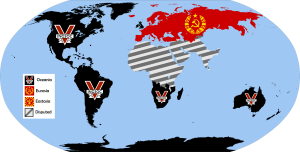Despite expectations that the Presidential election debates would serve as the substantive part of the election campaign, the three debates between Al Gore and George W. Bush were only another shallow bit of show biz, only slightly more confrontational than a stump speech or the party conventions.
The fundamental flaw may have been the mutual agreement that the candidates could not question each other. A rapid-fire dialogue demands spontaneous answers. The slower-paced formats used here in 2000—moderator-based questioning, “informal” debate, and the town hall—allowed both candidates to serve up their canned responses to the expected questions. Moderator Jim Lehrer even preceded each question in all three debaters by announcing its category: “this question is on education,” “this question is about gun control.” This gave the candidates an extra moment to recall their rehearsed answers to questions of that category.
Neither candidate revealed a spark of spontaneity in answering questions. Specific questions were rarely addressed. Instead a question served merely as an opportunity for a candidate to monopolize two minutes of national TV airtime.
The debates are clearly not about policy matters per se, and there is little evidence that a majority of the American people want them to be. If they were, Al Gore’s obvious wonkish mastery would be earning him a double-digit lead in national polls. It is widely believed that a strong intellect is not the most important qualification for the job of President.
Many people watch the debates for the same reason they watch stock-car racing—they want to see somebody crash. Presidential debating faux pas are mythological moments in that thimble-sized part of the American psyche that thinks about the past. Think of Richard Nixon’s perspiration and five o’clock shadow against Kennedy in 1960. Think of Ford’s assertion in 1976 that the Russians did not control Poland. Think of Carter in 1980 relating how he had just asked little Amy Carter what concerned her the most (nuclear arms control), which was spun into the image that Carter consulted little Amy on nuclear policy.
Some candidates self-destruct, others deliver zingy one-liners that win them elections. Reagan (!) won in 1980 on the basis of “There you go again.” And in 1984—as the country half-suspected he was aging fast and losing his marbles—he ensured his re-election by stammering out his scripted line about not exploiting “the youth and inexperience of my opponent” (Walter Mondale).
“Dubya” Bush is obviously running a Reaganesque campaign. The “fuzzy math” he accused Gore of using in the first debate recalled his father’s calling Reaganomics “voodoo economics.” Clearly, the Bush campaign, with its “aw shucks” simplicity, has a far deeper condescension for the American people than Gore. Gore, while petulant and pedantic, at least believes the people can understand more than Bush’s knee-jerk slogans. Bush, whose father was President only eight years ago, is running as a Washington outsider! He ceaselessly attacked Gore’s “Washington” talk, as if having knowledge of bills pending before Congress was in itself incriminating.
So Bush runs as the Washington outsider. He says he distrusts the Government, but trusts the people. He says he believes in local initiatives, especially in education and health care. So why does he want to be President?
His sole experience in public service is one-and-half terms as governor of Texas. “It’s a big state,” he kept insisting during the debate, much like a young man describing his first job out of college as “a big job.”
Bush’s poll numbers got a boost after the first debate, probably because Gore was gloating over his obviously superior intellect. Gore couldn’t contain his astonishment that the fatuous Bush could even be applying for the job. Bush’s very inarticulateness makes him more appealing to many voters, who resent Gore’s “condescending” tone. Some have even suspected that Bush acts less articulate than he really is.
Now Gore is annoying. A person who knows worlds more factual information than we do about a topic usually is. Bush is more like the class clown smirking at the annoying teacher, and so is more popular.
Bush consistently scores higher on polls asking questions like “Which candidate would you rather have a beer with?” Or: “Who would you rather sit next to on an airplane?” Polls like this show both the low level of our political discourse, but also a realization by many voters that, in many respects, the President’s role is like that of so many other media personalities (except he makes less money even than Washington television sports personality George Michael).
But it should be clear that that isn’t what being a President is about. It’s actually a job that benefits from a lot of hard work and attention to detail, traits which make Gore (who can be very very annoying) a much stronger candidate. Moreover, Gore, were he to be elected, may well learn to relax.
Since the last election we have seen the renascence of professional wrestling and the rise of “The Jerry Springer Show.” So I guess I should count my blessings. As tepid as the debates were, at least they didn’t degenerate into sheer taunting and one-upmanship. But stay tuned for 2004. It may well feature the same two candidates.
I think I’ll vote for Nader.





Be First to Comment